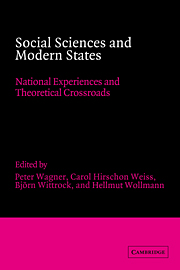Book contents
- Frontmatter
- Contents
- Acknowledgements
- Notes on contributors
- Part I National experiences in comparative perspective
- 1 The policy orientation: legacy and promise
- 2 Social science and the modern state: policy knowledge and political institutions in Western Europe and the United States
- 3 Political events and the policy sciences
- 4 From policy analysis to political management? An outside look at public-policy training in the United States
- 5 Networks of influence: the social sciences in the United Kingdom since the war
- 6 National contexts for the development of social-policy research: British and American research on poverty and social welfare compared
- 7 Political culture and the policy orientation in Dutch social science
- 8 Arenas of interaction: social science and public policy in Switzerland
- 9 The influence of social sciences on political decisions in Poland
- 10 The impact of social sciences on the process of development in Japan
- 11 Changing roles of new knowledge: research institutions and societal transformations in Brazil
- Part II Policy sciences at the crossroads
- Part III Epilogue
- Index
9 - The influence of social sciences on political decisions in Poland
Published online by Cambridge University Press: 05 February 2012
- Frontmatter
- Contents
- Acknowledgements
- Notes on contributors
- Part I National experiences in comparative perspective
- 1 The policy orientation: legacy and promise
- 2 Social science and the modern state: policy knowledge and political institutions in Western Europe and the United States
- 3 Political events and the policy sciences
- 4 From policy analysis to political management? An outside look at public-policy training in the United States
- 5 Networks of influence: the social sciences in the United Kingdom since the war
- 6 National contexts for the development of social-policy research: British and American research on poverty and social welfare compared
- 7 Political culture and the policy orientation in Dutch social science
- 8 Arenas of interaction: social science and public policy in Switzerland
- 9 The influence of social sciences on political decisions in Poland
- 10 The impact of social sciences on the process of development in Japan
- 11 Changing roles of new knowledge: research institutions and societal transformations in Brazil
- Part II Policy sciences at the crossroads
- Part III Epilogue
- Index
Summary
The relations between the social sciences and policy making have been investigated primarily in the United States and to some extent in Western Europe. Here we turn to another part of the world: this chapter discusses the case of Poland.
Our analysis focuses on the relationship between representatives of the social sciences and the institutional centre of Polish society, that is, the political authorities, prior to the regime-shattering events of 1989. Both sides were engaged in interaction in an attempt to structure and define their relationship almost from the founding of the People's Republic of Poland. The history of these relations encompasses a series of events that would be difficult to present, we believe, by means of some simple schema, though this is often done in terms of, for example, a history of the struggle of the social sciences to gain autonomy from the political and ideological control of the party and the state. The problem is much broader than this. The postwar years have brought about so many multifarious situations worthy of note that we abandoned the attempt to describe in detail even the most important among them. Instead, we outline certain mechanisms that have characterized, first, individual and group orientations within the social sciences, second, the actions of the institutional centre itself, and, lastly, the broad antecedents of the functioning of this entire system.
- Type
- Chapter
- Information
- Social Sciences and Modern StatesNational Experiences and Theoretical Crossroads, pp. 207 - 220Publisher: Cambridge University PressPrint publication year: 1991
- 1
- Cited by



